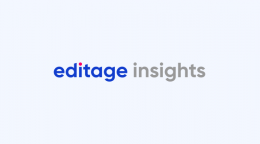Taking the leap: A scientific editor shares her experience of moving from academia to industry
Careers outside academia
Graduate students, early career researchers, or even established researchers may sometimes be unaware of opportunities other than the traditional path of academic research. This series aims to introduce them to exciting and rewarding careers that can be pursued outside academia. We bring you interviews with experts from diverse backgrounds who share their experiences from their non-academic journeys and tips on how to transition to these paths.

Have you wondered what could be awaiting you outside of an academic career? To help you get a glimpse of what lies beyond academia, how the transition feels like, and what skills you’d likely bring with you, we are bringing to you an exciting series!
As you know, we and our parent organization Editage have always supported researchers who have explored unconventional career paths. So we spoke to our colleagues at Editage who after completing their PhD journey transitioned to exploring scientific editing – where they now work closely with researchers to help them succeed at getting published.
Meet Kaivalya Mudholkar! She has a PhD in Molecular Biology and Biochemistry from Freiburg University in Germany. Now she plays the role of Managing Editor for Center of Excellence for Biochemistry, Genetics, and Molecular Biology at Editage. Find out how her journey has been!
Could you tell us a bit about your experience and your current role?
I have a PhD in Molecular Biology and Biochemistry from Freiburg University in Germany. I worked on protein signaling pathways in relation to nutrient and other stress factors during my PhD and post-doc. I wanted to take a pause to decide whether I want to continue in academia (the instability worried me!) and found CACTUS/Editage to be a good fit for me both in terms of a career and culture! I started as an associate editor and now manage the Biochemistry, Genetics, and Molecular Biology team. My role involves making sure we're delivering the best quality products every day to researchers and truly helping them succeed in their research careers.
What was it like to transition from being a full-time researcher to someone who helps researchers full-time?
Since I absolutely loved wet-lab research, I was quite unsure of whether I'd be able to adjust to the 'corporate' world. However, I think the leap was well worth it! My current role allows me to stay close to science, read interesting work, and at the same time learn about the other side of research communication & publication. Having had experience in writing and going through the publication process as an author, it now gives me great happiness to know that I can help someone else. I know how the language barrier or lack of publication experience can be a roadblock to disseminating interesting & significant research and I find it quite unfair that this is the case. Good research deserves to be published and get recognized and my current in helping authors experience a smooth publication journey is really gratifying.
Was the transition challenging and in what way?
Yes, there were challenges for sure! One was 'unlearning' things to adapt to professional editing. As a researcher, I wrote things in a certain way and had my own ideas on how research should be written and presented. However, professional scientific editing also involves following certain guidelines to meet service requirements and offer customers (i.e. researchers) consistent quality and output. Also, one might have been great at research, but editing/writing is a different skill; I had to learn not to equate my research experience with how good an editor I'd be! Another interesting challenge was to learn to think in terms of customer perspective – in academia, we usually don't have to worry about this! However, in a professional set-up, I had to think about everything from the point of view of customer delight and meeting their needs. Finally, as my role evolved over the years, I had to learn people and project management as well, which was entirely new for me. Having said this, all these challenges were exciting, refreshing, and great learning opportunities!
Are there any skills or takeaways from your academic background that help you in your current role?
I believe my academic background helped immensely. To start with, understanding how scientific research is conducted allowed me to critically assess the manuscripts I was editing/reviewing. For example, it was easy for me to spot missing details, missing experiments, unclear descriptions, etc. and help researchers improve their work. Having read hundreds of papers in my academic career and having written some for publication gave me experience in effective scientific communication, keeping information crisp, creating interest for the end-reader, etc. In my current role as a manager, I still use scientific techniques – a simple example would be ensuring we always have a 'control' group when piloting projects and analyzing impact! Or even considering all variables. Skills picked up in academia are never wasted!
Comments
You're looking to give wings to your academic career and publication journey. We like that!
Why don't we give you complete access! Create a free account and get unlimited access to all resources & a vibrant researcher community.

Subscribe to Career Growth







































